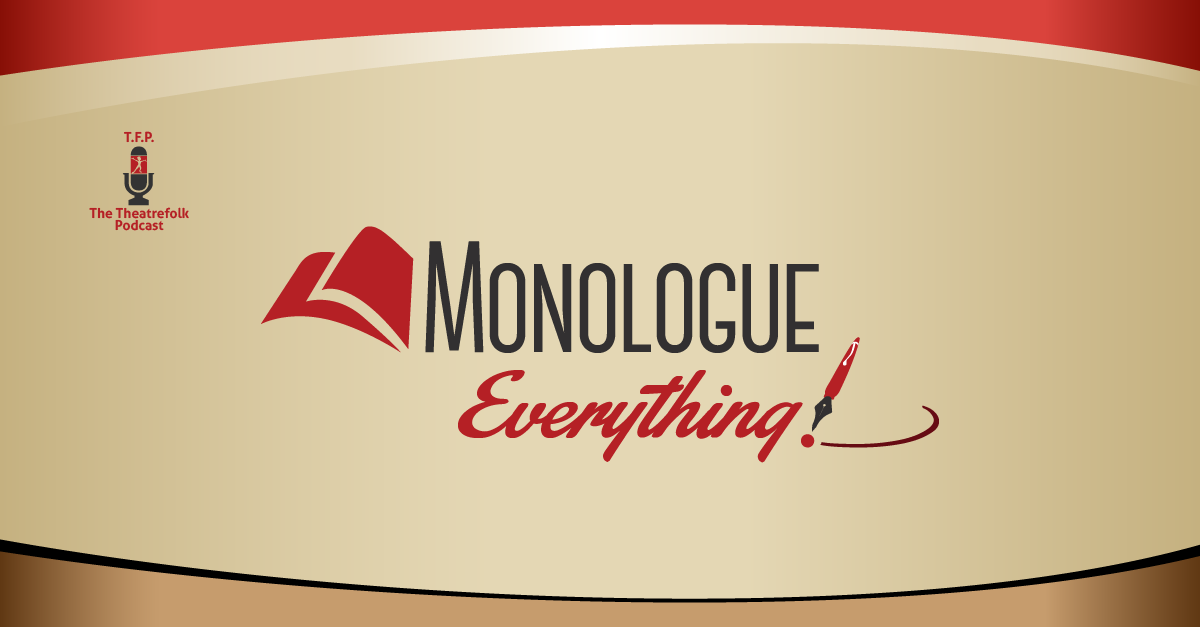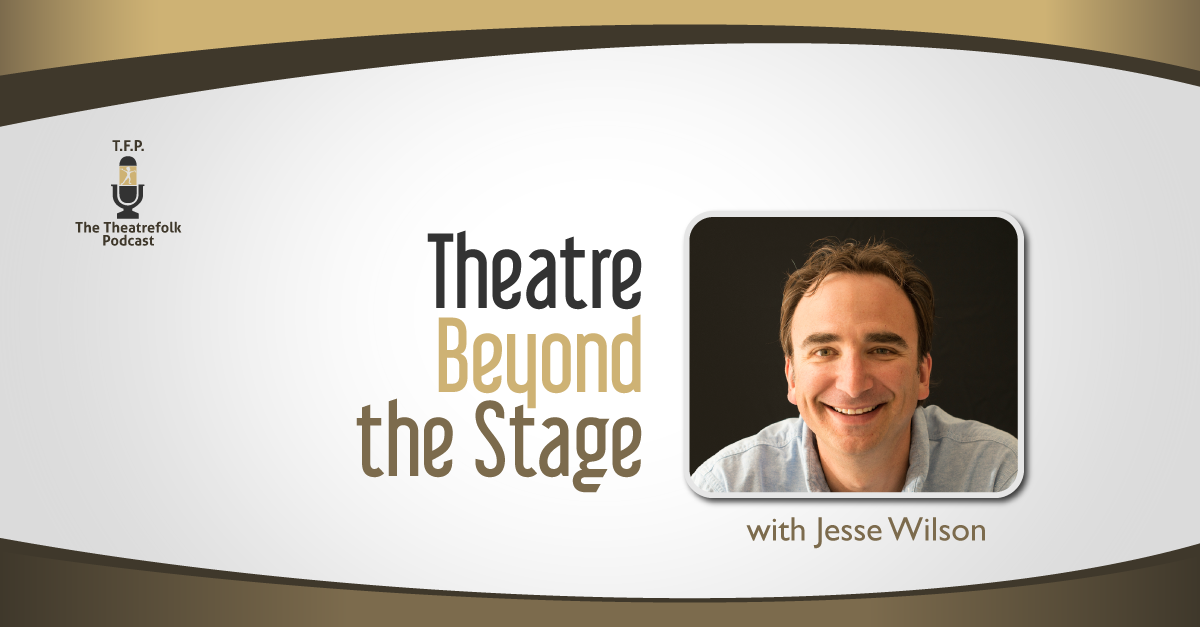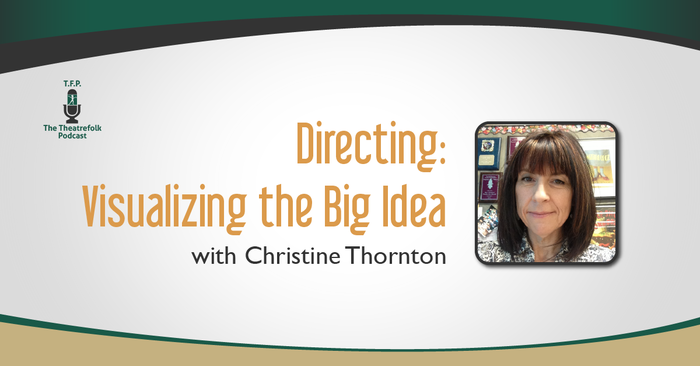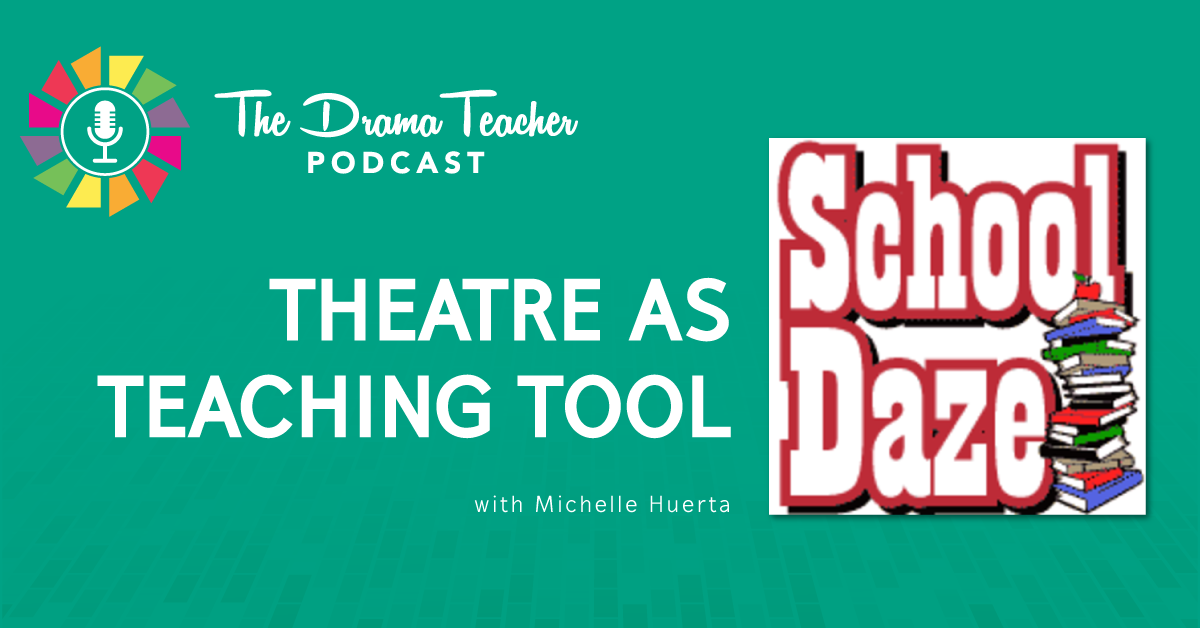The Monologue Everything Program
Episode 90: The Monologue Everything Program
In this podcast Lindsay talks about her love of monologues and the process of writing The Monologue Everything Program.
Show Notes
Episode Transcript
Welcome to TFP, The Theatrefolk Podcast. Whoop whoop! I’m Lindsay Price, resident playwright for Theatrefolk. Hello, I hope you’re well. Thanks for listening.
This is Episode 90. You can catch the links for this episode in the show notes at theatrefolk.com/episode90.
So, it’s been a while since I’ve done a “me” only podcast. (Hello, me. How are you? I’m doing awesome! Thanks for asking!) And the reason I’m doing it is because this is a very special week for me. It’s the launch of the Monologue Everything Program that I wrote. It is a two-ebook set that has taken me, I guess, a year and a half – over a year and a half – to go from idea to fruition. It’s been a long process.
So, it’s a step-by-step teacher’s guide to writing monologues and I couldn’t be happier to have: a) completed it, and b) get it out there in the world. I’m very glad it’s done and this will probably be the, you know, the last time I talk about it, but I do want to talk about it in this format where I can talk a little more in-depth. And the first thing I want to do is share a story.
So, I think that not a lot of ours customers, even our long-term customers, know that Theatrefolk started out as a production company before we were a publication company, before we were a publisher. And it was Craig and I, still – way back then and still to this day – and we loved theatre and we wanted to make a go of it and we formed a company. So, we wrote plays and we acted in them and we directed them and we did all the sets and the costumes for them. You know, we’re a two-hand band which I guess we still are, a little bit. And, frankly, we didn’t make very much money doing all this. We didn’t have very much.
And so, you know, you sort of get in a little bit of a spin cycle because we didn’t have money to, you know, hire extra actors or hire set designers, and we didn’t have money to go on big tours, and we didn’t know what to do. And we knew that were other companies out there who were doing this, other small companies, and we thought, “Well, why can’t we do this?” and it was around that time when I met the guy who really changed my life and really is, whether he knows it or not – I don’t think he does – but he’s really responsible to put me on the path to becoming the playwright I am and also the reason that Theatrefolk exists and that’s a director by the name of Dave Cheoros and he was casting for a Fringe Festival tour.
I know at this time I had an idea of what Fringe Festivals were. I’d never been to one but I had heard of them. You know, these week-long festivals where they’re mostly made up of one-act plays. But I didn’t know that you could, you know, put a tour together and that got my spidey senses really tingling and I went out and I auditioned and I got cast which was awesome and I spent four months touring. I toured from Montreal to Vancouver – which is like going from, I guess, Maine to California let’s say – and I took in a lot. I saw a lot of shows, a lot of different kinds of shows. I even volunteered at some festivals so I could see more shows. And I was seeing a lot of one-person monologues and that sort of clicked for me.
And, also, the fact that you could really tour on the cheap. You could tour, you know, as long as you had a car, you could do this, and I wanted to do it so, the next year, I wrote a show for myself, a one-person monologue show, it was called The Happy Positive Rejects Club. Really, it was about relationships and I played seven different characters and I learned two big things: I learned that I love writing monologues, that was the germ of it for me and I still do; but I really hated performing them. That’s a huge problem when you’re the only person on stage, if you’re not enjoying what you’re doing and there’s really no one else to lean on; it’s just you.
So, I started writing for Craig. I wrote a monologue about Galileo for him. I wrote one on a Canadian folk hero called the Flying Bandit. And I was just learning all the time. I was learning about how to make these monologues really work because Fringle Festival audiences, they’re very fickle. They’re like children’s theatre audiences; if they don’t like what you’re doing, they’re going to tell you and they’re going to go to the next show because there’s always a next show. There’s a next show, like, in the theatre or the space right beside you. So, you have to keep an audience and I was really learning about how much character was king and how, if you’re going to have one person play different characters, they have to have different voices. They have to be specific, especially if there’s one person, there better be some kind of interesting journey to keep your audience engaged.
So, we did that for six years and a really horrible thing happened in that, at the end of it, we were completely and utterly burned out. We couldn’t even conceive of thinking about doing another tour. I wasn’t acting anymore. Craig was really tired of talking to himself. We were done and there was another where we were like, “Well, what do we do now?” and maybe naively, maybe ignorantly, and I think that’s a good thing – I think sometimes it’s a really good thing to be ignorant – because we just basically said, “Well, we have all these plays. Why don’t we sell them? We’re not going to do them anymore. Why don’t we sell them? And that’s how Theatrefolk was born, and that’s as it exists now, and that’s how I became the playwright that I was going to be because I started moving in this direction. And, really, the one thing that has stayed with me all this time is how much I really love the monologue form, and all my plays have at least one monologue in them now and always will, I think – unless I’m trying something.
And, as I’ve grown as a writer, and as I continue to write and continue to have this focus as Theatrefolk – we specialize in plays for schools and student performers – so I got into the classroom and I spent more and more time teaching students how to write and I just grew to love them. I love student writers; I love what they have to say and I really firmly believe that all students have a writing ability in them that they can express themselves with the written word.
And I know this is true. I’ve taught, you know, hundreds of playwriting classes. And I also know it’s true that students are not necessarily “the greatest” at writing monologues, you know, let’s call that “people” – people are not the greatest at writing monologues because there is a real trick to it. There is a skill. Just because a monologue is a small project does not mean that it is an easy one. And just because a student says they know how to write a monologue doesn’t mean that that’s necessarily true that they know what it means to do that form.
Really, not all that long ago, I was teaching a workshop for middle school students, you know, and I say, you know, “Do you know what a monologue is?” and everybody says, “Yes.” “Okay, great!” and I give the instruction that you’re going to write this in the first person and what I got back through a lot of these kids was stories. So, they said they knew what a monologue was, but the concept of writing is was not firmly entranced in them. And I can say a monologue is not a story until I’m blue in the face, but, you know, there has to be a procedure and a process for students to follow to actually get it.
But I just think that monologues are so… I think they’re amazing and they’re versatile and they’re so useful, you know? You can use it in the classroom, you can use a monologue as a warm-up, you can use it as character development, you can use it as a cross-curricular exercise – you know, you’re learning history, what better way to show that you understand, that you comprehend this historical figure, by writing a monologue for them in their voice or talking about what they believed in, what their concept is.
So, all of this was, you know, the genesis for the idea to write this book. I have two other books that are theatre resources – Scene Spurs, a picture prompt guide, and Write Your Own Vignette Play. So, it made perfect sense to me that I would write about monologues and it was going to be just like those books were – just single, you know, “how to write a monologue” book, 30 to 40 pages, make an ebook, get it out there. So, the obvious question is that did not happen and why did it take so long? If that’s what it was going to be, why did it take so long?
And what happens is that, these past couple of years, we have just got so focused on what’s going on out there and what’s going on out there is that, in the drama classroom, in order for the drama classroom to survive, it has to be linked to curriculum, it has to be linked to, you know, all this stuff about common core that’s coming out. It’s got to be useful. And, when I look around, I had to say to myself, “How can I make this book useful?”
And, also, that the teachers are busy, drama teachers. I don’t think there is a busier teacher than the drama teacher. I am always amazed at how much time outside the actual teaching classroom that drama teachers put in. So, to say to a teacher, a drama teacher, “Okay. Here’s this great book. Read it and then you go do something with it. You go take the next step.” That’s not going to happen and I wanted to have this one ebook which is sort of like a personal learning book so that you can, you know, read it and sort of get an idea for yourself about how to write a monologue and what you might use in the classroom and then have a completely separate companion book which is everything you need to use in the classroom. So, lesson plans – you know, if there’s a lesson plan already in place then that means that the books are useful. If there is a rubric in place so that you can just print it off, if there is a checklist in place, if I mention some kind of handout in the lesson plan, I’d better have that handout ready to go.
So, this became a huge, huge project as chapters and exercises turned into really extensive lesson plans with everything that a teacher might need and I will not lie – this was not easy! It’s really hard to do this because it’s not easy and that kind of writing, it takes a certain type of brain power, and I don’t mind using that side of my brain to write because, if I’m being honest, I didn’t know I had that in me. I think I’ve always thought of myself as one type of writer and this is what I’ve learned about myself: it’s so fascinating to me that I thought that there was only one kind of writing that I can do and that I’ve always been really involved with playwriting because it’s something that my flaws and my lack of some writing skills – like grammar, like, hello, do not come up to me on the street and ask me what an adverb is, I might punch you because I don’t know.
In this particular, the skill of writing lesson plans, you know, you need to be in a very specific mood to write about Bloom’s Taxonomy, right? I know you know what I’m talking about. And I like it. I like it! I think that’s really weird to say, but I can do it and I wanted to do it because I want to be helpful. I think that is completely a waste of time to write, for me to write a book that I like for me, you know, and, even as I’m sitting here and I’m talking about this, all I can hear is, “I, I, I, I” because I want everything we do to be helpful for you and useful. Useful is very big.
So, speaking of useful, I knew that, so my next step… So, again, doing all this stuff, I knew that once I headed down that rabbit hole and I knew that the lesson plans, once I did them, they had to be vetted by teachers, you know, I’ve used these exercises, I’ve used all of this – I’ve done all the trial and error in this. I’ve made the mistakes. But once they were in that very specific form, you know, it’s one thing for me to say that I use them as a workshop presenter, it’s another thing to say that a teacher has used them in their classroom or gone through them and read them as a teacher does to use them in their classroom.
So, every lesson plan went out to a teacher and, in the book, I call them my teacher advisory panel and they evaluated them and they were amazing because everyone I asked was able to come back and say, “Yes, absolutely! I would love to do this for you,” and I have one teacher, she read one and she’s like, “Oh, give me another one! Give me another one!” and I was like, “Yay!” which is another weird thing to say, you know, that you’re making someone happy by giving them a lesson plan.
And, the other thing, it was really scary. One of the scariest parts of this was to send my stuff out to people who know what they’re doing because I can talk a game and I have confidence in myself as a playwright, for sure, and I have confidence that I know how to create exercises and implement them, for sure, and I have confidence that I can, you know, take a model, that I can model a lesson plan and work on that, absolutely, but you never know. I have been surprised before when I sent my stuff out.
And the thing is that, when you’re doing any artistic project, any kind of project, feedback has to be a part of the process. It is so necessary. You know, no product should ever take that final step without some feedback and, for me, it is more scary than skydiving. It’s more scary to put myself out there. I would rather just stay in my house and look out the window and do my own little thing, and yet, I know firm well that, if I’m going to have a product that is of any value, if I’m going to do anything of any value, it needs feedback.
And something that I’ll just say really briefly is that, when you give something to somebody for feedback, the most important thing you can do is just say, you know, don’t ask for someone’s opinion. Tell them exactly what you’re looking for so that they have a frame of reference when they read your work. If they have a frame of reference then there’s parameters and it’s not a ubiquitous – if I’m, ugh, I just used a fancy word and I’m not sure I used it correctly – not that it’s like jello and it’s sort of oozing out everywhere and it’s hard to contain. If you give parameters then your feedback person knows exactly how they’re supposed to look at your work and then can respond. “Yes, what you asked me to do, I can see it.” “No, what you asked me to do, it’s missing.” And that way, you have tangible feedback. It’s useful in order to move forward. Useful – we like that word.
So, thankfully, not only did I get some very positive comments but I also got back great advice. Like, “Put a checklist with each assignment so the student knows exactly what they’re supposed to do, and, further, that they have to sign off on their work. They are saying, “Yes, I understand the assignment,” “Yes, I’ve read the instructions,” “Yes, I’ve included everything asked of me in the instructions.” It’s right there. Boom boom boom. Great idea, never thought of it, and I’m so happy that now every assignment has a checklist. Woohoo!
And, lastly, I think one thing that’s really cool about this project that I want to share that you’d never know, you would know this about the Monologue Everything Program – plug plug! – that it’s transcontinental. This book has been everywhere. Concepts of this book have been everywhere. So, I’m here and I’m at Theatrefolk Global Headquarters in Ontario in Canada. So, the teachers advisory panel who looked at the lesson plans, they come from, some from Ontario but also from, you know, across the states – a couple of California, Florida, Alabama. The editor of the two books is in Ireland. I love the Internet!
And then, the graphics designer, so, the woman, the lovely woman who designed all the look for the book lives in Romania. And then, we also had a text editor who is in another country. It’s just amazing to me, first of all, that this is possible. That, me living in my little town, in other years and decades and centuries, I might not be able to put together something like this because I don’t have the resources right in front of me.
But, now, we are global and we are able to reach out to, you know, different parts of the world to get our work looked at and made so that it’s the best that it can possibly be. And it’s a real fallacy to think that writing is a one-person event. For a lot of it, sure, it’s you and your page – yes, of course. But, to bring it to life like this, you know, it takes a lot of people and I’m so grateful to everyone who has had a small part in this little venture.
So, at the end of all this, I am amazed and I am excited because I think it’s a really great program and I think that it’s a wonderful opportunity to get students writing. I love when I see a student who is not expected to write well and doesn’t think it themselves they can write well because they’ve been told they can’t write well, and they are given the steps and the tools to produce something and be proud of it, and I think that this is something that can really help with that.
So, I’m also really tired. It’s amazing how much work – and I know it’s not coal mining, I know it’s not coal mining, but – it’s a lot of brain power to put all the pieces into play and to make sure that it is bright and shiny and, more than anything, useful. So, I just started vacation. So, we launched and then went on vacation. And so, my first task on this vacation is I have a hotel room that’s going to look out on the ocean. Hotel room, beach, ocean – I’m going to spend a lot of time just looking at the ocean. I don’t do beaches – sand, pervasive – don’t like it. But I love a water view and I love looking at water and I just can’t wait.
Now, before we go, let’s do some THEATREFOLK NEWS.
Okay. What am I going to talk about? I don’t think it’s going to be a surprise. Do you? It should be no surprise! I’m going to talk about the Monologue Everything Program! I think that everything can become a monologue and everyone can write a monologue. They absolutely, absolutely can.
So, the Monologue Everything Program, it’s really designed to give you a solution. Every little thing you need to teach students to write great monologues. It is the fastest way to get from the blank page to students writing with ease and it’s really accessible. You can start using it in the classroom immediately.
And what is it? It’s got two parts. So, there’s the Monologue Everything Ebook and this book takes you through the process as if you were a student. So, the book speaks to you directly. It is designed for personal learning. And then, the Monologue Everything Classroom Edition, this is the heart and soul of the program. It’s my heart and soul. It takes the Monologue Everything Ebook and turns it into lesson plans. Lesson plans, checklists, rubrics, peer evaluation, peer editor sheets, everything. And both books are delivered electronically and are printable PDFs. So, that means that everything I just said – those handouts, those rubrics, those assignments – they can be printed out for your students or they can even be thrown out on a smart board if you want to do it that way, and you get them both immediately.
And I really want to hit home here, nothing has been left out of this program. I’ve developed it, tested it, I stand behind this entire system. You can learn to write monologues as your students do. You can teach monologues with ease. Every step is laid out in the lesson plans. Every lesson plan has got a very specific theme to it, a very specific assignment, and everything is all included. Go to theatrefolk.com/monologueeverything for more information on how to get this great program today.
You can also get that link in the show notes for this episode, theatrefolk.com/episode90.
Finally, where, oh, where can you find this podcast? We post new episodes every Wednesday at theatrefolk.com and on our Facebook page and Twitter. You can find us on YouTube.com/Theatrefolk. You can find us on the Stitcher app and you can subscribe to TFP on iTunes. All you have to do is search on the word “Theatrefolk.”
And that’s where we’re going to end. Take care, my friends. Take care.
Music credit:”Ave” by Alex (feat. Morusque) is licensed under a Creative Commons license.



